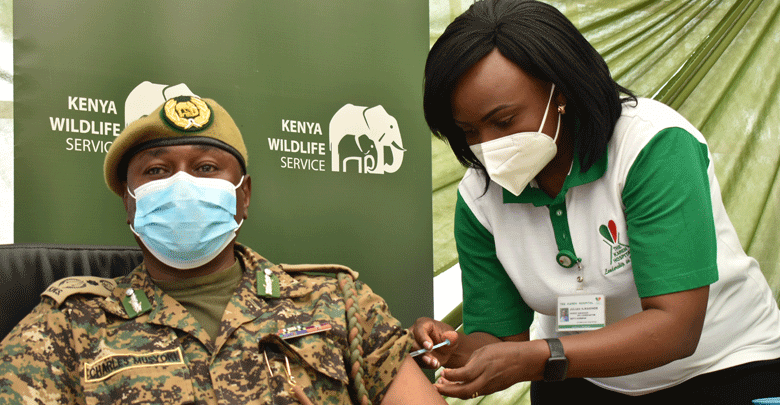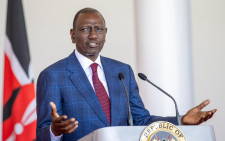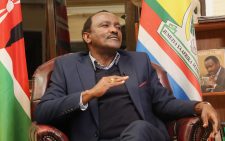Uhuru chairs crisis meeting as Covid vaccine stock runs low

President Uhuru Kenyatta on Monday convened a crisis meeting to explore alternative sources of fresh supplies of Covid-19 vaccines amid reports of a looming shortage of the jab.
Sources at Afya House intimated to the People Daily that the available stock of the Oxford AstraZeneca vaccine would only last between 10 to 14 days before the shelves empty.
With India having temporarily suspended the export of the vaccine, the Monday State House meeting is said to have approved a recommendation from the Ministry of Health for “a delayed” second jab by four weeks.
This means that persons who received their first dose in early March and are due for the second one in early May, will now have it either towards the end of that month or early June.
Uncertainty now surrounds the arrival of the second batch of about 2 million doses of the vaccine after India suspended all exports to stock for domestic use following a sharp rise of new Covid-19 infections in the Asian superpower.
Available statistics from the Health Ministry indicate that between 90,000 to 100,000 Kenyans are being administered with the jab each day, save for the weekends. With such a high turnout, the current stock may not last long.
The move by India, described as a “temporary squeeze” by the Indian government officials, is expected to affect supplies in 190 countries under the Covax program, Kenya included, until at the end of this month.
The Covax scheme, which is led by the World Health Organisation (WHO), aims to ensure vaccines are shared among all countries.
Exports stopped
The Serum Institute of India, which is the world’s largest producer of AstraZeneca, stopped the exports early this month.
Kenya is now sourcing for funds to purchase the vaccine from other sources such as the US, Netherlands of Belgium.
Sources say the government may require an estimated Sh30 billion if it decides to procure the vaccines directly from some of the manufacturers.
Two other options on the table are that Kenya bypasses the Covax scheme and buys the vaccine directly from India or enters into a deal with Johnson and Johnson.
Though possibilities of the government procuring Moderna and Pfizer have been explored, sources say authorities are lethargic to the idea due to stringent storage and transportation required in their administration.
The government is expected to announce the final decision any time this week.
“We are working around the clock to find a solution. The stock we have at the moment can only last about 10 days, by which time the first batch of persons who received the jab would be due for their second injection,” Dr Willis Akhwale, the chairman of the task force of Covid-19 Deployment and Vaccination told the People Daily.
Akhwale, however, downplayed fears that some people may miss out on their second jab. But Akhwale could neither confirm nor deny about the Monday meeting.
“We will have the second doses that people need within the 12th week window instead of the eight weeks we had set. This means we are still within the timelines set by WHO,” Dr Akhwale said.
At the State House meeting, which began at around 10 am and ran on till 3pm, were members of Akhwale’s team, Health Cabinet Secretary Mutahi Kagwe, his Treasury counterpart Ukur Yatani, their two Principal Secretaries Susan Mochache and Dr Julius Muia.
Others were the Health Director General Dr Patrick Amoth and senior officials from the Ministry of Health and Pharmacy and Poisons Board (PPB).
President Kenyatta is said to have directed the Treasury to urgently mobilise funds for the purchase of the vaccine from other options as they wait for India to resume normal supplies.
“The President ordered us to ensure that the country receives its next batch of vaccines as soon as possible. What I can tell you is that we are racing against time to actualise the directive,” said one of the officers present at the Monday meeting.
President Kenyatta’s meeting at State House came in the wake of reports that African Union and Centres for Disease Control and Protection (CDC) are working on joint ventures to roll out vaccine production on the continent.
Treasury to mobilise fund
Already, South Africa’s President Cyril Ramaphosa has announced that his country has entered into a partnership with Johnson & Johnson to start a manufacturing plant.
Should everything go as planned, South Africa targets to produce 30 million vaccine doses for its people and another 200 million for use across the continent.
“Availability is a challenge that all countries are going through. A number of countries in Africa thought that they would start the vaccination earlier, but availability is a major challenge,” Ramaphosa is reported to have stated.
Yesterday, Dr Githinji Gitahi, the group chief executive of Amref Health Africa, who is also a member of the National Emergency Committee on Coronavirus (NERC) confirmed that the government is doing everything possible to ensure the availability of AstraZeneca by mid-May.
“AstraZeneca will be available through Covax in time for the second dose. All approved vaccines are available for Kenya either for direct purchase or through Covax,” Gitahi observed.
On the other hand, Dr Collins Tabu, the director of National Vaccines and Immunisation Programme.










